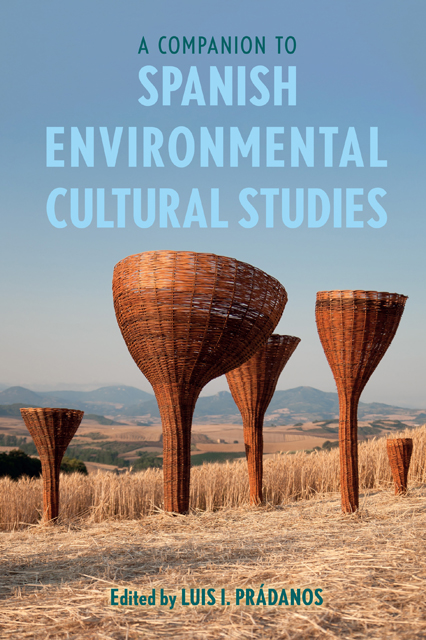Book contents
- Frontmatter
- Contents
- List of Illustrations
- List of Contributors
- Note on the Translations
- Acknowledgements
- Introduction: Spanish Environmental Cultural Studies
- Part I Environmental Cultural History and Political Ecology
- Part II Water and Power
- Part III Ecologies of Memory and Extractivism
- Part IV Animal Studies and Multispecies Ethnographies
- Part V Food Studies and Exploitative Ecologies
- Part VI Ecofeminism
- Part VII (Neo)Colonial and Racialized Ecologies
- Part VIII Tourism and the Environmental Imagination
- Part IX Eco-Mediation and Representation
- Part X Trash and Discard Studies
- Bibliography
- Index
6 - Developmentalism and the Political Unconsciousness: The Spanish Forms of Necro-Extractivism, from the Civil War to Neoliberal Democracy
Published online by Cambridge University Press: 08 June 2023
- Frontmatter
- Contents
- List of Illustrations
- List of Contributors
- Note on the Translations
- Acknowledgements
- Introduction: Spanish Environmental Cultural Studies
- Part I Environmental Cultural History and Political Ecology
- Part II Water and Power
- Part III Ecologies of Memory and Extractivism
- Part IV Animal Studies and Multispecies Ethnographies
- Part V Food Studies and Exploitative Ecologies
- Part VI Ecofeminism
- Part VII (Neo)Colonial and Racialized Ecologies
- Part VIII Tourism and the Environmental Imagination
- Part IX Eco-Mediation and Representation
- Part X Trash and Discard Studies
- Bibliography
- Index
Summary
This text begins with a landscape. With the image of a landscape (Figure 6.1): the old Mount Neme tungsten mine. Since World War I, the shortage in Europe of this mineral, key to the manufacture of projectiles and armor, endowed the Peninsular northwest with crucial strategic importance. Hitler secured the exploitation of the Iberian reserves in payment for German aid to General Franco during the Spanish Civil War. Later, the Korean War made Galician mining attractive again, sealing North American interest for the country’s incorporation into the capitalist bloc. Finally, after a short period of time, when all operations ceased, the presence of the mine was consigned to local community memory, and to the wounded memory of the landscape. Extraction had also damaged archaeological heritage: both lesser-known local sites and more well-known ones. With the metal extracted, stories about underground mythical dwellers, pagan cults, priestesses, and witches evaporated. The mine dug a crater also into the imaginary. This immense pit tells us about the death caused by the mineral that was extracted from it. And in its emptiness, a turquoise blue lake slowly formed – one of poisonous waters.
This lake was pictured at the center of the image mentioned above, and in the summer 2019 featured as part of the annual tourism campaign by the Galician State Government. As an immediate effect, a legion of instagrammers and like-hunters flocked to the scene in search of the ultimate selfie, even at the cost of getting intoxicated by the lake, as they later commented on in their own social media. The anecdote captures the aesthetic-political tension explored in this article, the one that occurs between memory and form, by involving our political relationships with the environment. Today, the digital circulation of images dissociates forms from the history that shaped them, and which explains their inscription in a given territory. History establishes the specific way in which a particular form still relates to the physical space where it has been conceived for a function. No matter how much digital replicas are offered as a transparent object for consumption, what we see in Monte Neme is still the residue of an extractive process. The burns on the influencers' bodies just confirm it.
- Type
- Chapter
- Information
- A Companion to Spanish Environmental Cultural Studies , pp. 79 - 87Publisher: Boydell & BrewerPrint publication year: 2023

